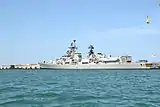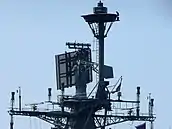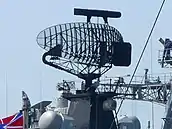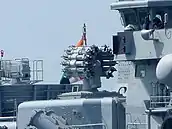Delhi-class destroyer
The Delhi-class destroyers are guided-missile destroyers of the Indian Navy. Three ships of this class are in active service.[1] The Delhi-class vessels were the largest vessels to be built in India at the time of their commissioning.[4] The ships were built by Mazagon Dock Limited (MDL) at a cost of ₹750 crore (equivalent to ₹26 billion or US$360 million in 2019) each.[5]
 INS Delhi during Defence of Gujarat in 2013. | |
| Class overview | |
|---|---|
| Name: | Delhi class |
| Builders: | Mazagon Dock Limited |
| Operators: |
|
| Preceded by: | Rajput class |
| Succeeded by: | Kolkata class |
| Built: | 1987–2001 |
| In commission: | 1997–present |
| Planned: | 3 |
| Completed: | 3 |
| Active: | 3 |
| General characteristics | |
| Type: | Guided-missile destroyer |
| Displacement: | 6,200 tonnes (full)[1] |
| Length: | 163 m (535 ft) [1] |
| Beam: | 17 m (56 ft)[1] |
| Draught: | 6.5 m (21 ft)[1] |
| Propulsion: |
|
| Speed: | 32 knots (59 km/h; 37 mph)[2] |
| Range: | 4,500 mi (7,200 km) at 18 knots (33 km/h; 21 mph)[2] |
| Complement: | 350 (incl 40 officers)[1] |
| Sensors and processing systems: |
|
| Electronic warfare & decoys: | |
| Armament: | |
| Aircraft carried: | 2 × Sea King Mk 42B helicopters[2] |
Development
The design and development of the ship class began as "Project 15" in 1980. Initially, the ships were planned to be follow-on frigates of the Godavari class with the addition of RBU-6000 ASW rocket launchers and gas turbine propulsion. A Soviet offer in 1983 for reversible gas turbines and modern weapon systems forced a redesign of the ships from 3,500 tonne frigates to 6,300 tonne destroyers.[6] Directorate of Naval Design completed the design around the mid 1980s.[7] Model tests were carried out at SSPA, Sweden in 1985 and parallelly at Krylov Institute, Soviet Union in 1986. Severnoye Design Bureau provided design inputs for weapons and propulsion packages. The mutual interface suppression system for electromagnetic compatibility was supplied by the Soviets.[6] The break-up of Soviet Union affected the supply of weapon systems, contributing to a three-year delay in the construction of vessels.[4]
Design and description
Delhi class has been described as a stretched Rajput class with some elements incorporated from Godavari-class frigates and Sovremennyy-class destroyers.[2][8] The fore funnel is placed on the port side, while the aft funnel is placed on the starboard.[2] The propulsion system consists of two Zorya-Mashproekt M36E gas turbine plants driving two controllable-pitch propellers. Each gas turbine plant comprises two DT-59 reversible gas turbines connected to an RG-54 gearbox in a combined gas and gas system and is placed in a separate engine room.[8] The vessels are equipped for operation in a nuclear, biological and chemical warfare environment.[4] Delhi-class vessels are fitted with flag facilities, enabling them to act as command unit in task groups.[8] INS Mysore features better air conditioning facilities to correct heat dissipation issues encountered while operationalising INS Delhi.[9]
Armament
For air defence role Delhi class is fitted with 9K-90 Uragan air-defence system comprising a pair of 3S-90 single-arm launchers and 9M38M1 Shtil missiles. One launcher is installed forward of the bridge and the other atop the dual helicopter hangar. Each launcher carries a 24 missile magazine for a total of 48 rounds. MR-775 Fregat-MAE (NATO: Half Plate) radar provides target designation and 6 MR-90 Orekh (NATO: Front Dome) illuminators are used for fire control.[8] The system can track twelve targets and engage a maximum of six tracked targets simultaneously.[10] Last-ditch missile defence is provided by a close-in weapon system consisting of four AK-630 rotary cannons guided by two MR-123-02 (NATO: Bass Tilt) fire-control radars. A Signaal LW08 radar license produced by BEL as RAWL provides long range air search capability.[8]
The surface missile battery of Delhi class includes 16 Kh-35E Uran missiles placed in four quadruple sloped launchers. The missiles are guided by a Granit Garpun B (NATO: Plank Shave) fire-control radar.[2] The missile battery was initially intended to be eight 3M80E Moskit cruise missiles as evidenced by large blast deflectors present on the lead ship, INS Delhi. A single AK-100 gun guided by MR-184 fire-control system is also fitted.[8]
A quintuple 533-millimetre (21 in) trainable torpedo launcher capable of firing SET 65E active/passive homing torpedo and Type 53–65 wake homing torpedo is placed in between the funnels.[11][2] A pair of 12-tubed RBU-6000 213mm anti-submarine rocket launchers fitted in front of the bridge can engage submarines up to a range of 6 km (3.7 mi).[10][2] Detection is provided by BEL HUMVAD, an indigenous hull-mounted sonar with a variable depth transducer that offers better performance in the waters around India.[10] An Indal Model 15-750 handling system manufactured by GRSE is used to deploy the variable depth sonar of HUMVAD.[12] The final ship of the class, INS Mumbai, is fitted with an improved ASW suite consisting of BEL HUMSA hull-mounted sonar and Thales ATAS towed array sonar.[8]
The electronic warfare suite consists of BEL Ajanta Mk 2 for electronic support measures, Elettronica TQN-2 jammer and two PK-2 chaff launchers of Russian origin.[2] BEL Shikari combat display and management system, a derivative of Italian IPN-10, integrates weapon systems of diverse origin.[8] Each vessel can carry two Westland Sea King Mk 42B helicopters. The helicopters carry a surface search radar, a dipping sonar, A244-S lightweight torpedoes and Sea Eagle anti-ship missiles.[10] Samahé helicopter handling system is fitted on all vessels.[2]
Modernisation
The Delhi class is being upgraded with the IAI/Rafael Barak 1 point air defence missile system. A pair of eight-cell vertical launch system replaces two AK-630 mounts in front of the aft mast. The missiles have a range of 10 km (6.2 mi) and use command line-of-sight guidance provided by a pair of EL/M-2221 fire-control radars that replace MR-123-02 fire-control radars on upgraded ships.[2][8] An upgrade to BrahMos supersonic missiles was sanctioned in 2015.[13] Atlas Elektronik ACTAS towed-array sonar will also be installed on all three ships.[14]
Ships of the class
| Name | Pennant | Builder | Laid Down | Launched | Commissioned | Homeport | Status |
|---|---|---|---|---|---|---|---|
| INS Delhi | D61 | Mazagon Dock Limited | 14 November 1987 | 1 February 1991 | 15 November 1997[2] | Mumbai | Active |
| INS Mysore | D60 | 2 February 1991 | 4 June 1993 | 2 June 1999[2] | |||
| INS Mumbai | D62 | 14 December 1992 | 20 March 1995 | 22 January 2001[2] |
Gallery
 INS Delhi departing Portsmouth Naval Base, UK, 2009.
INS Delhi departing Portsmouth Naval Base, UK, 2009._docked_using_the_shiplift_system_at_Naval_Ship_Repair_Yard_at_INS_Kadamba_(Karwar).jpg.webp) INS Delhi docked using the shiplift system at Naval Ship Repair Yard at INS Kadamba (Karwar).
INS Delhi docked using the shiplift system at Naval Ship Repair Yard at INS Kadamba (Karwar). INS Mysore and USS Fitzgerald transit in formation during Malabar.
INS Mysore and USS Fitzgerald transit in formation during Malabar..jpg.webp) INS Mysore during IMDEX 2007.
INS Mysore during IMDEX 2007._along_with_an_Il-38_underway_during_Narendra_Modi's_visit.jpg.webp) INS Mumbai along with an Il-38 during an exercise.
INS Mumbai along with an Il-38 during an exercise.
See also
References
- "IN Ships-Destroyers-Delhi Class". Indian Navy. Archived from the original on 27 January 2013. Retrieved 28 December 2011.
- Commodore Stephen Saunders, ed. (2004). "India". Jane's Fighting Ships 2004–2005 (107th ed.). Coulsdon: Jane's Information Group. p. 308. ISBN 978-0710626233.
- Commodore Stephen Saunders, ed. (2008). "India". Jane's Fighting Ships 2008–2009 (111th ed.). Coulsdon: Jane's Information Group. p. 324. ISBN 978-0710628459.
- Bedi, Rahul (17 September 1997). "Indian-built destroyer to be commissioned". Jane's Defence Weekly. Horley: Jane's Information Group. ISSN 0265-3818.
- Bedi, Rahul (1 May 1999). "Mixed fortunes for India's defense industrial revolution". Jane's International Defense Review. Coulsdon. 32 (5). ISSN 1476-2129.
- Hiranandani, G. M. (2009). Transition to eminence: The Indian Navy 1976–1990. Delhi: Lancer. pp. 50–51. ISBN 9788170622666.
- Hiranandani, G. M. Transition to Guardianship: The Indian Navy 1991–2000. Lancer Publishers LLC. ISBN 9781935501664.
- Annati, Massimo (November 2004). "The Asian DDG Race". Military Technology. Vol. 28 no. 11. Bonne: Mönch Publishing Group. pp. 31–39. ISSN 0722-3226.
- "Indian destroyer set for commission". Jane's International Defense Review. Coulsdon: Jane's Information Group. 32 (4). 1 April 1999. ISSN 1476-2129.
- Khan, M A (September 1998). "DELHI and beyond". Military Technology. Vol. 22 no. 9. Bonne: Mönch Publishing Group. pp. 68–70. ISSN 0722-3226.
- "MDL's Major Programmes – SP's Naval Forces". SP's Naval Forces. SP Guide Publications. September 2013.
- "India | First Project 15 set to commission". Jane's Navy International. Coulsdon: Jane's Information Group. 1 September 1997. ISSN 1358-3719.
- "Nod to new aircraft carrier, BrahMos missiles for six ships". Business Standard. IANS. 13 May 2015.
- Shukla, Ajai (25 November 2014). "Sonar contract provides major boost to navy". Business Standard. New Delhi.


_Vladivostok_2011-04-19.jpg.webp)

